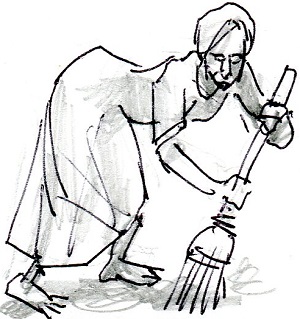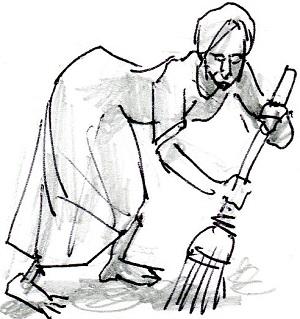

“Woman, you are set free of your infirmity” (Luke 13:12).
Eph 4:32--5:8; Luke 13:10-17
Luke’s story of the healing of the crippled woman in the synagogue on the sabbath offers a rich example of the use of symbolism in the Gospels. It is among several such miracles in defiance of the law forbidding “work” on the sabbath, but in this instance, the healing of a woman bent over for 18 years strongly suggests added significance. Luke is called the “Gospel of Women” for a reason.
The underlying controversy in these miracles on the sabbath is that placing the law ahead of human need put unnecessary and unfair burdens on people. Jesus’ example of the right of a farmer to feed an ox on the sabbath (or in another story, to rescue it from a ditch) more than makes the case for healing the woman who has been bent over for 18 years.
A second theme Jesus advances is that the Law has never of itself brought freedom; only God’s mercy can release us from the bondage of sin. It is no coincidence that from the time of Abraham to Jesus, 18 centuries have passed, and obedience to the Law has not accomplished uprightness. Only God’s love can lift us up. What human effort cannot accomplish grace makes possible. Jesus is Lord of the Sabbath because he is the very grace of God made visible. The crowd is awestruck at his authority because what they are witnessing is a theophany, not just a healing.
Another theme we have come to appreciate more because of contemporary movements on behalf of women is that Luke’s story focuses on a woman when women had few rights in a world dominated by men. The crippled woman would have been hardly visible, segregated from the men in a side area of the synagogue and not allowed to speak. Jesus finds her at the margins and heals her, to the great annoyance of the leader, who cites the sabbath law as more important than the spectacular miracle that has just occurred before his eyes.
Bible-literate people surely felt the power of this story during other struggles for women’s rights. Women’s suffrage in the American democracy took from 1848 to 1920 to become law. It took another 46 years to secure the vote for African American citizens in southern states. The Equal Rights Amendment still awaits ratification. If many Gospel stories affirm Jesus’ regard for the equality of women in the church, that affirmation has yet to be realized by the all-male leadership of the Catholic church today.
The coincidence of hearing this Gospel read and preached today may elicit reactions on the appropriateness or irony of proclaiming it on the day the U.S. Senate advances another justice to the U.S. Supreme Court. The Word always invites us to think and pray about the significance of events in our world.
Advertisement








